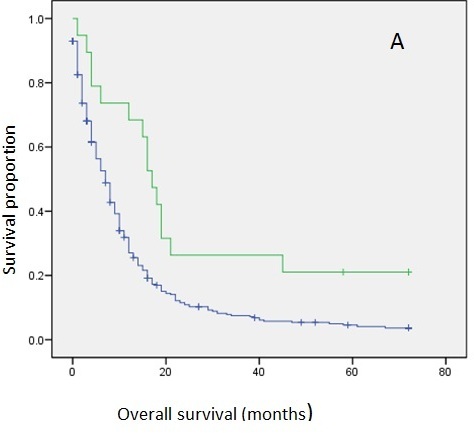|
Back to Annual Meeting Posters
Does Surgery Have a Role in the Treatment of Small Cell Cancer of the Esophagus?
Moshim Kukar*1, Adrienne Groman1, Graham W. Warren3, Usha Malhotra2, Chukwumere Nwogu1, Todd L. Demmy1, Sai Yendamuri1
1Surgical Oncology, Roswell Park Cancer Institute, Buffalo, NY; 2Medical Oncolgy, Roswell Park Cancer Institute, Buffalo, NY; 3Radiation Medicine, Roswell Park Cancer Institute, Buffalo, NY
Introduction: Small cell cancer of the esophagus is an uncommon malignancy with perceived poor prognosis. Due to its rarity, no large case series has been examined to guide therapeutic decisions. We examined the SEER database to analyze factors determining outcome of this unusual malignancy.
Methods: All patients with esophageal cancer in the SEER database from 1973 - 2009 were included. Characteristics of patients with and without small cell cancer were compared. Univariate and multivariate analyses examining the relationship of small cell histology with overall survival (censored at 72 months) were performed in all patients as well as those undergoing surgical resection. In addition, only patients with small cell cancer were analyzed to examine the potential benefit of surgery.
Results: 387 of 64,799 (0.6%) patients with esophageal cancer had small cell histology. Patients with small cell histology were similar in age and race, but had a higher proportion of females compared to other histologies (40.6% vs. 25.4%; p<0.001). These patients also had higher grade (p<0.001) and higher stage (p<0.001) at diagnosis and were less likely to undergo surgical resection (4.9% vs. 18%; p<0.01). In both all-comers as well as those undergoing surgical resection, univariate analyses showed a worse survival in patients with small cell esophageal cancer. However, multivariate analyses adjusting for age, gender, grade, stage, race and number of lymph nodes examined did not show a statistically significant association between small cell histology and overall survival in both sets of patients. Univariate analysis of patients with small cell cancer alone demonstrated a significant association of surgery with median survival (17 months vs. 7 months; p=0.002) (Figure 1).
Conclusions: This large study of small cell esophageal cancer confirms the clinical observation that small cell cancer of the esophagus is an aggressive disease. In addition, we show that outcomes with this disease are associated with stage of disease and not histology. Therefore, surgical resection for esophageal cancer patients with this histology should be offered based on stage rather than histology alone.

Figure 1. Patients with small cell esophageal cancer undergoing surgical resection (green line) have a better survival than those with no surgical resection (blue line) on univariate analyses
Back to Annual Meeting Posters
|


